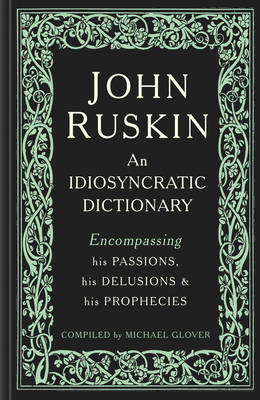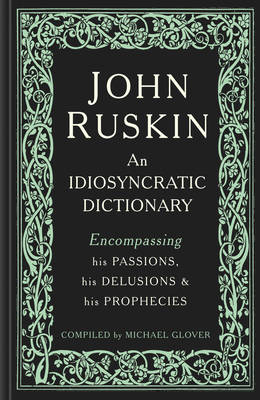
Door een staking bij bpost kan je online bestelling op dit moment iets langer onderweg zijn dan voorzien. Dringend iets nodig? Onze winkels ontvangen jou met open armen!
- Afhalen na 1 uur in een winkel met voorraad
- Gratis thuislevering in België vanaf € 30
- Ruim aanbod met 7 miljoen producten
Door een staking bij bpost kan je online bestelling op dit moment iets langer onderweg zijn dan voorzien. Dringend iets nodig? Onze winkels ontvangen jou met open armen!
- Afhalen na 1 uur in een winkel met voorraad
- Gratis thuislevering in België vanaf € 30
- Ruim aanbod met 7 miljoen producten
Zoeken
John Ruskin
An Idiosyncratic Dictionary Encompassing His Passions, His Delusions and His Prophecies
Michael Glover
Hardcover | Engels
€ 32,45
+ 64 punten
Omschrijving
From Aesthete to Ziffern, Baby-Language to Verbosity, Badgers to Railway Stations: this gloriously serendipitous dictionary presents the life, times, and strong opinions of John Ruskin (1819-1900)--art critic, patron, draftsman, watercolor painter, social thinker, and philanthropist. Michael Glover's delightful A-Z distills the essence of Ruskin, revealing a lighter side to the man known for his thirty-nine volumes of ponderous prose. When off his guard, Ruskin could write pithily and amusingly, but he was also a fascinating amalgam of self-contradictions. Combining judiciously selected extracts from Ruskin's writings with the author's wittily insightful interpretations, this book is essential reading for all those curious to know what Ruskin did with a cyanometer, why he hated iron railings and the Renaissance, and how Proust's admiration of the man was tinged with distrust.
Specificaties
Betrokkenen
- Auteur(s):
- Uitgeverij:
Inhoud
- Aantal bladzijden:
- 160
- Taal:
- Engels
Eigenschappen
- Productcode (EAN):
- 9781848223745
- Verschijningsdatum:
- 15/11/2019
- Uitvoering:
- Hardcover
- Formaat:
- Genaaid
- Afmetingen:
- 137 mm x 206 mm
- Gewicht:
- 317 g

Alleen bij Standaard Boekhandel
+ 64 punten op je klantenkaart van Standaard Boekhandel
Beoordelingen
We publiceren alleen reviews die voldoen aan de voorwaarden voor reviews. Bekijk onze voorwaarden voor reviews.











